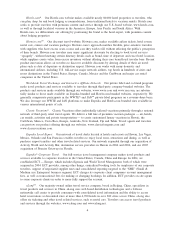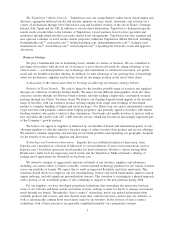Expedia 2007 Annual Report Download - page 20
Download and view the complete annual report
Please find page 20 of the 2007 Expedia annual report below. You can navigate through the pages in the report by either clicking on the pages listed below, or by using the keyword search tool below to find specific information within the annual report.In addition, we have experienced a high rate of executive turnover since 2005. Our future success will
depend on the performance of our senior management and key employees, many of whom joined Expedia
recently. Expedia cannot ensure that it will be able to retain the services of Mr. Diller, Mr. Khosrowshahi or
any other member of our senior management or key employees, the loss of whom could seriously harm our
business. In addition, competition for well-qualified employees in all aspects of our business, including
software engineers and other technology professionals, is intense. Our continued ability to compete effectively
depends on our ability to attract new employees and to retain and motivate our existing employees. If we do
not succeed in attracting well-qualified employees or retaining or motivating existing employees, our business
would be adversely affected. We do not maintain any key person life insurance policies.
Our stock price is highly volatile.
The market price of our common stock is highly volatile and could continue to be subject to wide
fluctuations in response to factors such as the following, some of which are beyond our control:
• Quarterly variations in our operating results;
• Operating results that vary from the expectations of securities analysts and investors;
• Changes in expectations as to our future financial performance, including financial estimates by
securities analysts and investors;
• Reaction to our earnings releases and conference calls, or presentations by executives at investor and
industry conferences;
• Changes in our capital structure;
• Changes in market valuations of other internet or online service companies;
• Announcements of technological innovations or new services by us or our competitors;
• Announcements by us or our competitors of significant contracts, acquisitions, strategic partnerships,
joint ventures or capital commitments;
• Loss of a major supplier participant, such as an airline or hotel chain;
• Changes in the status of our intellectual property rights;
• Lack of success in the expansion of our business model geographically;
• Announcements by third parties of significant claims or proceedings against us or adverse developments
in pending proceedings;
• Additions or departures of key personnel;
• Rumors or public speculation about any of the above factors; and
• Market and volume fluctuations in the stock markets in general.
Our international operations involve additional risks and our exposure to these risks will increase
as we expand our international operations.
We operate in a number of jurisdictions outside of the United States and intend to continue to expand our
international presence. In order to achieve widespread acceptance in the countries and markets we enter, we
must continue to tailor our services and business model to the unique circumstances of such countries and
markets, including supplier relationships and traveler preferences. Learning the customs and cultures of various
countries, particularly with respect to travel patterns and practices, can be difficult, costly and divert
management and personnel resources. Our failure to adapt our practices and models effectively to the traveler
and supplier preferences of each country into which we expand could slow our international growth.
We expect to continue to face additional risks in international operations. These risks include political
instability; threatened or actual acts of terrorism; changes in regulatory requirements;, our ability to comply
with additional U.S. laws applicable to U.S. companies operating internationally as well as local laws and
14
























